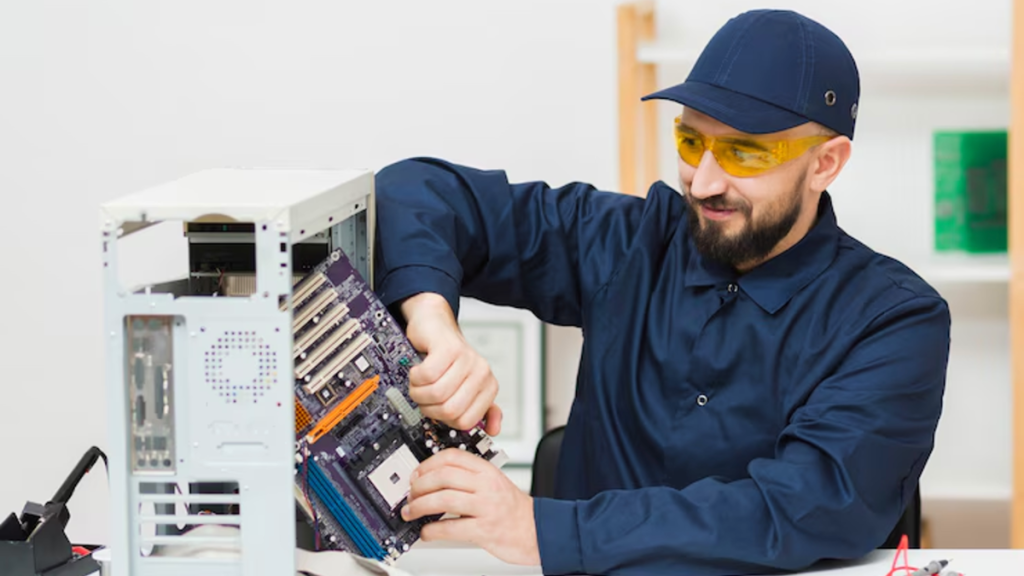Are you someone who enjoys solving tech problems and helping others? Becoming a computer support technician might be the perfect career path for you!
But why should you choose this career?
Computer problems can be simple, like a wrong setting, or more serious, like viruses, damaged hardware, or a system crash. In some cases, the whole operating system needs to be reinstalled. That’s where computer support technicians come in — they help businesses and individuals get back on track.
Thanks to computer support technician training, these professionals know how to tackle a wide range of tech issues quickly and efficiently.
How Computer Support Technicians Work?
As a technician, you have flexible options for how and where you work:
- On-site support – You can visit offices or homes and charge by the hour.
- In-shop services – Customers bring their devices to your repair shop.
- Pickup and delivery – Some technicians offer convenient transport services.
- Recycling – Many also help safely dispose of old or broken equipment.
This flexibility makes it a great career choice, whether you prefer fieldwork or working in a set location.
What Devices Will You Work On?
With the right training, you’ll be able to fix and support:
- Desktop computers and laptops
- Servers and computer clusters
- Mobile devices and smartphones
You’ll also work with peripheral devices like:
- Input devices – keyboards, mice, and scanners
- Output devices – monitors, printers, and speakers
- Storage – hard drives, SSDs, external drives
And if you specialize in network support, you may also work with:
- Routers and switches
- Wi-Fi systems and fiber optic setups
How Can Computer Support Technicians Help?
Data Protection
One of the most valuable parts of the job is protecting people’s data. Whether it’s personal photos or important work files, you’ll learn how to:
- Recover data safely
- Preserve settings during repairs
- Make sure devices are up and running with minimal downtime
Sometimes the fix is as easy as adjusting a setting. Other times, you might need to uninstall or reinstall software to solve the issue — and your training will teach you exactly how to do it right.
Hardware Problems
Sometimes, the actual parts inside a computer break—like the hard drive, RAM (memory), or even the screen. These issues can’t just be fixed with a quick Google search. As a technician, you’ll have the tools and know-how to open up a computer, find the problem, and replace the broken parts safely.
You’ll be the one who brings their dead computers back to life.
Software Issues
Maybe a computer won’t start right, crashes often, or certain programs just won’t work. These are software problems, and they can be tricky for the average user to figure out.
You’ll be trained to spot bugs, fix errors, and install or update programs so everything runs the way it should.
People will rely on you to keep their systems running smoothly.
Virus and Malware Removal
Viruses and other bad software can slow down a computer, steal personal info, or even make it unusable. Many people don’t know how to safely remove these threats—but you will.
As a technician, you’ll know how to clean up infected systems and add protection to stop future attacks. You’re basically a tech superhero!
Help People Avoid Bigger Problems
A lot of people try to fix their computers on their own because they think hiring a professional will cost too much. But that’s not always true! Most technicians charge fair prices, and if there’s an extra cost, it’s usually because a part needs to be replaced.
Trying to fix a computer without the right skills can actually make things worse—and more expensive. That’s where you can help people avoid these mistakes, and that makes you valuable.
To Wrap Up
Being a Computer Support Technician isn’t just about fixing machines—it’s about saving people time, money, and stress. When someone’s computer has a serious problem—like broken hardware, software glitches, or a virus—you’re the expert they count on.
By using your skills, you help them get back to work, protect their important files, and keep everything running smoothly.
So if you’re looking for a career that’s rewarding and always in demand, this is it. Becoming a technician doesn’t require a university degree—just the right computer support technician courses make the difference.

